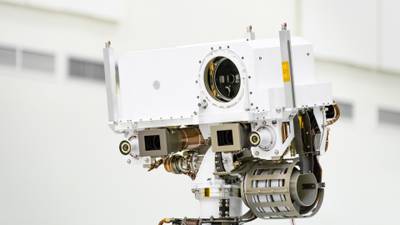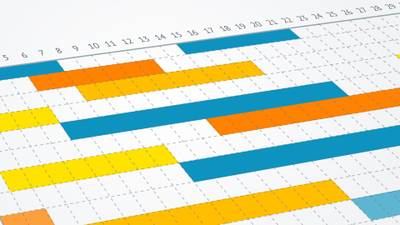Join an industrial robot programming course you can study online.
This flexible online short course is a key part of MSc Industrial Robotics.
In this course, you’ll develop your understanding of programming techniques for:
- industrial robots
- mobile robots, and
- autonomous robots that learn from their experiences.
With expert guidance, you’ll develop your skills in a range of programming approaches, including:
- robot-oriented programming
- task-oriented programming
- decision trees
- machine learning, and
- reinforcement learning (RL).
You’ll also learn about the fundamentals of machine learning that are relevant for robotics research and practice.
Who can join this industrial robot programming course?
This distance-learning course is designed for graduates with backgrounds in engineering, applied mathematics, or physics.
Python programming experience
You’ll also need to have experience in a high-level programming language, eg, Python, as you’ll undertake assignments that feature programming elements.

Build credits towards a Masters degree
This online course is part of:
You can use the credits you earn with this short course towards this MSc qualification.
What you’ll study
In this course, you’ll learn about a range of approaches used to program industrial robots, mobile robots, and autonomous robots.
You’ll cover topics including:
- An introduction to industrial robot programming – nomenclature, history, state of the art, challenges
- Robot-oriented programming – Teach-Pendant programming, hand guiding, text-based programming, graphical offline programming
- Task-oriented programming – roadmap generation, uninformed graph search, informed graph search
- Decision trees – definition, decision-tree learning, overfitting, receiver-operating characteristic (ROC)
- Generative probabilistic classifiers – Maximum Likelihood Estimation (MLE), Maximum A Posteriori probability (MAP), Naive Bayes, Gaussian Naive Bayes
- Discriminative probabilistic classifiers – logistic regression, gradient descent, generative vs. discriminative classifiers
- Artificial neural networks – parameterized units, multilayer networks, backpropagation
- Task-oriented programming under uncertainty – Markov decision process (MDP), utility, value iteration, policy iteration
- Reinforcement learning – Monte-Carlo and temporal-difference learning, Q-learning, policy-based, actor-critic.
By the end of this course, you’ll be able to...
-
Derive maximum likelihood, a posteriori estimates, and apply Gaussian Naive Bayes.
-
Apply and implement graph-search techniques for path planning, including the computation of roadmaps.
-
Use and train decision trees, including the basic operations for data (pre)processing.
-
Apply dynamic programming techniques to Markov Decision Problems, including the computation of value functions and optimal policies.
-
Assess reinforcement learning (RL) solutions to toy-text, classic-control and robotics problems.
Choose the University of Aberdeen for industrial robot programming courses

Earn as you learn
We fit around full-time work, so you can earn qualifications while you keep earning a salary.

You’re in expert hands
We’ve been training world-class engineers for over 100 years and delivering online learning for decades.

20% alumni discount
University of Aberdeen alumni get 20% off this online course.
How you’ll study
Online learning
This distance-learning robotics programming course is delivered flexibly, 100% online.
You can learn with us anywhere in the world, no student visa required, and manage your hours to suit you.
Your teaching
This course is taught at Masters level.
Teaching is delivered through MyAberdeen, our online Virtual Learning Environment (VLE). It holds all the materials, tools and support you’ll need in your studies. Take a look around MyAberdeen.
You can access your learning materials on computer, smartphone and laptop, 24 hours a day. You’ll find a range of resources available, including:
- videos
- pre-recorded video lectures
- online tutorials
- reading materials
- the online resources of our award-winning Sir Duncan Rice Library.
Your tutors
This course is delivered by our School of Engineering.
You’ll learn from academics who are active researchers in the robotics area, with expertise in mechatronic systems, instrumentation and control, and mobile robotics.
This course is assessed online.
You’ll be assessed throughout your studies via:
- a laboratory report (worth 15% of your final course grade)
- a practice exam (15%), and
- an online timed exam (70%).
The course totals approximately 150 hours of study and assessment time. That’s around 10 – 15 hours per week.
This is an indicative guide to the time required for a typical student at this level to achieve the learning outcomes. This includes time for independent study, as well as teaching and assessments.
You can largely set your own study hours each week to cover the materials. MyAberdeen is available 24/7, so you can log in and study when it suits you.
Activities with deadlines
There will be some activities scheduled at fixed times, such as assessments with deadlines, or meetings with your tutor. But otherwise, you can access and work through the course at your convenience.
Our first-class support structure will ensure that you aren’t alone in your studies. You’ll have contact with your tutors via MyAberdeen and email. You can use social media and discussion boards to chat with your fellow students too.
We provide a wide range of services to support you in your studies and beyond:
- Careers and Employability Service – including one-to-one advice sessions
- Disability support
- IT support
- Library support
- Student Support Service – help with finances, stress, wellbeing and non-academic issues
- Student Learning Service – study support, with advice sessions available via phone or Skype
- Aberdeen University Students’ Association (AUSA) – run by students for students
- Toolkit – clever apps and free training that can make your study life easier
Wherever you are in the world, you’ll feel part of our very special Aberdeen learning community.
Your course coordinator

Dr Andres San Millan Rodriguez
Andres is a Lecturer in Robotics in our School of Engineering.
His expertise and research interests include origami-inspired soft robots, mobile robots, applied control, and mechatronics.
View Andres’ profileWhere this will take you
Towards a Masters
You’ll earn 15 credits at Masters level (SCQF Level 11) with this course. You can use these credits towards our online:

Masters in Industrial Robotics
Build your skills in engineering and AI, and learn to develop robotics technologies for diverse industry sectors.
View MSc Industrial RoboticsCareers in robotics and AI
You’ll complete this course with enhanced, multidisciplinary skills in the areas of robotics and artificial intelligence.
This course is designed to help you progress within or towards a career in robotics, in areas including:
- robotics
- artificial intelligence (AI)
- data analysis
- research and development
- education.
Continuing Professional Development (CPD)
Your employer or professional institute may recognise this course for CPD hours. Talk to your employer or institute to find out more.

Free career support
Access our free careers service while you study.
- 1:1 appointments
- CV checks
- Interview prep
- Job opportunities
Entry requirements
Entry requirements
We welcome students from all over the world.
This course has no formal entry requirements. You do not need to provide proof of your qualifications.
But you do need to check the entry guidance above to understand the level of teaching delivered, to decide if this course is right for you.
If you do not have qualifications from the UK, check the equivalent teaching level for your country.
Visa requirements
You do not need a student visa to study online with us.
English language requirements
Teaching is delivered in English.
You do not have to provide proof of your English language skills to join this course. But we want to make sure that you can use English well enough to study successfully.
Recommended level of English
For this course, we recommend the following level of English language proficiency.
These are our Postgraduate Standard requirements, and these are minimum scores.
IELTS Academic, IELTS UKVI Academic, and IELTS Online (not IELTS Indicator or IELTS General Training)
- 6.5 overall
- 5.5 for listening, reading and speaking
- 6.0 for writing
TOEFL iBT and TOEFL iBT Home Edition
- 90 overall
- 17 for listening
- 18 for reading
- 20 for speaking
- 21 for writing
- TOEFL DI code is 0818
Cambridge English: B2 First, C1 Advanced, or C2 Proficiency
- 176 overall
- 162 for listening, reading and speaking
- 169 for writing
LanguageCert Academic/LanguageCert Academic SELT
- 70 overall
- 60 for listening, reading and speaking
- 65 for writing
LanguageCert International ESOL B2 Communicator (Written and Spoken) – Online / In-centre
- Overall High Pass
- 33 for listening, reading and speaking
- 38 for writing
Oxford ELLT Digital – English Language Level Test Online
- 7.0 overall
- 5.0 for listening, reading and speaking
- 6.0 for writing
PTE Academic (online test not accepted)
- 62 overall
- 59 for listening, reading, speaking and writing
Duolingo – tests taken from 1 July 2024 onward
- 120 overall
- 95 for listening, reading and speaking
- 105 for writing
University of Aberdeen English Pre-sessional Programme (PSE)
- Pass
- Valid for one year. Refresher can be offered if out of date
Pre-sessional academic English preparation programmes undertaken at other UK universities
- Pass at an equivalent of 6.5 (C1)
- B2 in all four skills
- Certification must be within one year prior to the start of your course
For full information about language requirements, see our English Language Requirements page.
You will need access to:
A computer (PC, laptop or Mac) operating on either:
- Windows 10 or later
- macOS 10.15 (Catalina) or later.
Most teaching materials are smartphone- and tablet-friendly. But we recommend a proper laptop or desktop for completing assignments comfortably.
Reliable internet access
We recommend:
- a wired connection
- a minimum download speed of 2 Mbps so you can take part fully in live sessions.
Speakers or headphones
- We recommend a headset with built-in microphone and earphones if you’re likely to study in an environment with background noise.
- A webcam is optional, but you may like to use one for some interactive sessions.
Software
We’ll give you access to Office365 applications. This means you can use online versions of Microsoft Word, Excel, and PowerPoint and install these programs on up to five personal devices.
If your course requires specialist software, we’ll provide you with access to this and a licence that lasts throughout your studies.
See our detailed IT requirements for more information.
When you study with us, you can expect a first-class support structure so that you’re never alone in your studies.
But learning online does mean you have to motivate yourself and manage your own time.
Your most important commitment will be time – the time to work through, reflect on and understand your teaching materials.
Before you start a course that involves a high degree of independent study, we recommend looking at the time you will be able to devote to your studies each week:
- Be realistic
- Create a weekly schedule as a guide
If you have any questions about studying online, get in touch with our friendly team. We’re here to help.
Fee payment
Your course fee needs to be paid in full before you start your course.
We accept payment via Visa Debit, Visa Credit and Mastercard.
Ways to save
You may be able to get help funding this course via:
- discounts – if any discounts are available for this course, they’ll appear in the section below
- employer sponsorship – we accept full and partial fee payments from sponsors.
Find out more about funding options.
Student card
All our students are entitled to a University of Aberdeen student card. This gives you access to a range of student discounts around the city and online.
Learning resources
Access to all the books and resources you need are included in your tuition fee. They’ll be made available to you online and you do not have to buy your own copies.
Printing
You may wish to set aside a small budget for printing, depending on how you like to work.
This course has no formal entry requirements. You decide if it’s suitable for you.
The course is delivered at Masters level. At this level, you’d usually have at least:
- a 2:1 UK honours degree (or equivalent) in Engineering, or
- a 2:1 UK honours degree (or equivalent) in Applied Mathematics or Physics, or
- three years’ relevant experience that supports Masters-level study.
Python programming experience
In this course, you’ll undertake assignments that feature programming elements, so prior experience in a high-level programming language, eg, Python, is essential.
Apply for this course























































